11 start with H start with H
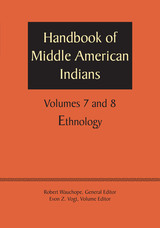
Ethnology comprises the seventh and eighth volumes in the Handbook of Middle American Indians, published in cooperation with the Middle American Research Institute of Tulane University under the general editorship of Robert Wauchope (1909–1979). The editor of the Ethnology volumes is Evon Z. Vogt (1918–2004), Professor of Anthropology in the Department of Social Relations, Harvard University.
These two books contain forty-three articles, all written by authorities in their field, on the ethnology of the Maya region, the southern Mexican highlands and adjacent regions, the central Mexican highlands, western Mexico, and northwest Mexico. Among the topics described for each group of Indians are the history of ethnological investigations, cultural and linguistic distributions, major postcontact events, population, subsistence systems and food patterns, settlement patterns, technology, economy, social organization, religion and world view, aesthetic and recreational patterns, life cycle and personality development, and annual cycle of life.
The volumes are illustrated with photographs and drawings of contemporary and early historical scenes of native Indian life in Mexico and Central America.
The Handbook of Middle American Indians was assembled and edited at the Middle American Research Institute of Tulane University with the assistance of grants from the National Science Foundation and under the sponsorship of the National Research Council Committee on Latin American Anthropology.


Paradoxically, at a time when hunting and gathering societies are almost a thing of the past, a subsistence system based on gathering is not only persisting but actually gaining ground in southeastern Indonesia. The economy of the small islands of Roti and Savu is centered on the intensive use of the lontar palm tree, whose juice is the staple of the people's diet and whose leaves, leafstalks, and trunks provide the wherewithal for their housing and most of their needs.
This economy, marvelously stable and adaptive, is described in detail by James Fox, and is contrasted with that of the large neighboring islands, Timor and Sumba; there slash-and-burn agriculture has led to steady ecological deterioration, in the wake of which the lontar economy of the smaller islands has gained a foothold and is gradually expanding. How these developments came about is revealed by an examination of the history of the islands over several hundred years and the effects of the policies of successive colonial governments. The historical perspective adds depth to the ethnographic presentation and is vital to the anthropological analysis of social change.
In preparation for the writing of this book the author spent three years in the Timor area, especially on Roti; learned Dutch, Indonesian, and several local island dialects; and had done intensive historical research in Indonesia and in archives in the Netherlands.
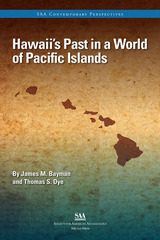

Focusing on a case study in the region of Maragatería, Spain, Gonzalez explores the ethnic and racial discrimination faced by the local population in the context of Spanish nationalism and shows how this hostile dynamic shaped what we recognize as the region’s heritage today. Challenging widespread notions about how and why we preserve traditional cultures, The Heritage Machine rethinks the relations between heritage studies and converging disciplines, from anthropology to cultural and memory studies.
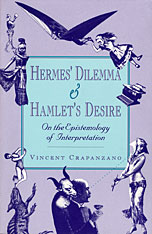
A distinguished anthropologist and a creative force behind postmodern writing in his field, Vincent Crapanzano here focuses his considerable critical powers upon his own culture. In essays that question how the human sciences, particularly anthropology and psychoanalysis, articulate their fields of study, Crapanzano addresses nothing less than the enormous problem of defining the self in both its individual and collective projections.
Treating subjects as diverse as Roman carnivals and Balinese cockfights, circumcision, dreaming, and spirit possession in Morocco, transference in psychoanalysis, self-characterization in teenage girls’ gossip, Alice in Wonderland, and Jane Austen’s Emma, dialogue models in hermeneutics, and semantic vertigo in Hamlet’s Elsinore, these essays look critically at the inner workings of interpretation in human sciences and literary study. In modern Western culture’s attempts to interpret and communicate the nature of other cultures, Crapanzano finds a crippling crisis in representation. He shows how the quest for knowledge of “exotic” and “primitive” people is often confused with an unexamined need for self-definition, and he sets forth the resulting interpretive paradoxes, particularly the suppression of any awareness of the play of power and desire in such an approach. What is missing from contemporary theories of interpretation is, in Crapanzano’s account, a crucial understanding of the role context plays in any act of communication or its representation—in interpretation itself.
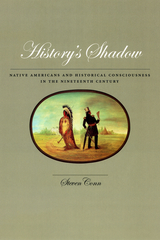
History's Shadow traces the struggle of Americans trying to understand the people who originally occupied the continent claimed as their own. Steven Conn considers how the question of the Indian compelled Americans to abandon older explanatory frameworks for sovereignty like the Bible and classical literature and instead develop new ones. Through their engagement with Native American language and culture, American intellectuals helped shape and define the emerging fields of archaeology, ethnology, linguistics, and art. But more important, the questions posed by the presence of the Indian in the United States forced Americans to confront the meaning of history itself, both that of Native Americans and their own: how it should be studied, what drove its processes, and where it might ultimately lead. The encounter with Native Americans, Conn argues, helped give rise to a distinctly American historical consciousness.
A work of enormous scope and intellect, History's Shadow will speak to anyone interested in Native Americans and their profound influence on our cultural imagination.

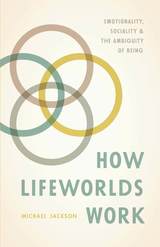
In How Lifeworlds Work, Jackson draws on years of ethnographic fieldwork in West Africa to highlight the dynamic quality of human relationships and reinvigorate the study of kinship and ritual. How, he asks, do we manage the perpetual process of accommodation between social norms and personal emotions, impulses, and desires? How are these two dimensions of lived reality joined, and how are the dual imperatives of individual expression and collective viability managed? Drawing on the pragmatist tradition, psychology, and phenomenology, Jackson offers an unforgettable, beautifully written account of how we make, unmake, and remake, our lifeworlds.
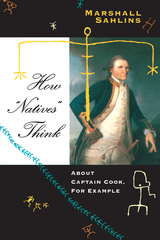
In recent years, these questions have arisen in debates over the death and deification of Captain James Cook on Hawai'i Island in 1779. Did the Hawaiians truly receive Cook as a manifestation of their own god Lono? Or were they too pragmatic, too worldly-wise to accept the foreigner as a god? Moreover, can a "non-native" scholar give voice to a "native" point of view? In his 1992 book The Apotheosis of Captain Cook, Gananath Obeyesekere used this very issue to attack Sahlins's decades of scholarship on Hawaii. Accusing Sahlins of elementary mistakes of fact and logic, even of intentional distortion, Obeyesekere portrayed Sahlins as accepting a naive, enthnocentric idea of superiority of the white man over "natives"—Hawaiian and otherwise. Claiming that his own Sri Lankan heritage gave him privileged access to the Polynesian native perspective, Obeyesekere contended that Hawaiians were actually pragmatists too rational and sensible to mistake Cook for a god.
Curiously then, as Sahlins shows, Obeyesekere turns eighteenth-century Hawaiians into twentieth-century modern Europeans, living up to the highest Western standards of "practical rationality." By contrast, Western scholars are turned into classic custom-bound "natives", endlessly repeating their ancestral traditions of the White man's superiority by insisting Cook was taken for a god. But this inverted ethnocentrism can only be supported, as Sahlins demonstrates, through wholesale fabrications of Hawaiian ethnography and history—not to mention Obeyesekere's sustained misrepresentations of Sahlins's own work. And in the end, although he claims to be speaking on behalf of the "natives," Obeyesekere, by substituting a home-made "rationality" for Hawaiian culture, systematically eliminates the voices of Hawaiian people from their own history.
How "Natives" Think goes far beyond specialized debates about the alleged superiority of Western traditions. The culmination of Sahlins's ethnohistorical research on Hawaii, it is a reaffirmation for understanding difference.

READERS
Browse our collection.
PUBLISHERS
See BiblioVault's publisher services.
STUDENT SERVICES
Files for college accessibility offices.
UChicago Accessibility Resources
home | accessibility | search | about | contact us
BiblioVault ® 2001 - 2024
The University of Chicago Press









